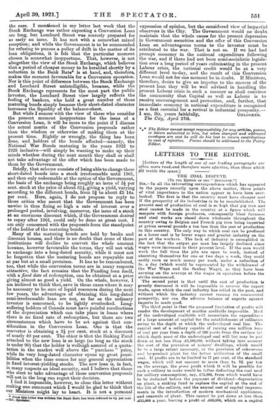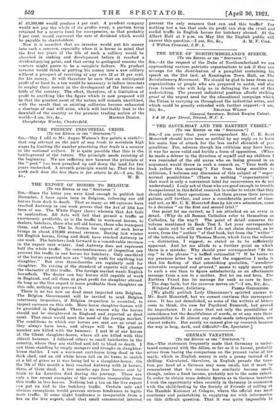LETTERS TO THE EDITOR.
[Letters of the length of one of our leading paragraphs are often more read,and therefore more effective, than those which fill treble the space.] THE COAL DISPUTE.
(To THE EDITOR Or THE " SPECTATOR.") SI11,—In all the interesting correspondence which has appeared in the papers recently upon the above matter, three points of vital importance to the nation appear to have been over- looked. The first is that the country must have cheaper ooal if the prosperity of its industries is to be re-established. The present coat of production of coal is so high that pig iron and steel cannot be made in the country at a figure which will compete with foreign producers, consequently blast furnaces and steel works are closed down wholesale throughout the country owing to Belgian and French pig iron being imported at prices several pounds a ton less than the cost of production in this country. The only way in which coal can be produced at a lower cost is by lower wages and greater industry on the part of the workers. The lack of industry is exemplified in the fact that the output per man has largely declined since wages were increased to their present level. If the men would work the full time the pits are open to work, instead of absenting themselves for one or two days a week, they could easily earn as much money per week, under a reduction of 5s. a day (which would be represented by the withdrawal of the War Wage and the Sankey Wage), as they have been earning on the average at the wages in operation before the strike commenced.
The second point is that until the cost of production greatly decreased it will be impossible to recover the export trade, upon which the coal industry has relied in the past, and 'without which the industry cannot resume its commercial prosperity, nor can the adverse balance of exports against imports be made good.
The third point is that the proposed limitation of profits will render the development of maiden coalfields impossible. Most of the undeveloped coalfields will necessitate the expenditure of a large amount of capital for the establishment of collieries owing to the depth at which the undeveloped coal lies. The capital cost of a colliery capable of raising one million tons of coal per year from a depth of 900 yards from the surface (at which depth most of the undeveloped coal will lie) may be put down at not less than £1,500,000. without taking into account the cost of the provision of miners' dwellings, which would be to a large extent necessary, or the provision of coke-ovens and by-product plant for the better utilization of the small coal. If profits are to be limited to 17 per cent. of the standard wages, which will not amount to more than ls. 7d. per ton on the average, the gross profit which it will be possible for such a colliery to make would be (after deducting the coal used for colliery consumption), say, £75.000, from which would have to be deducted before the payment of dividend—depreciation on plant, a sinking fund to replace the capital at the end of the life of the colliery, and the annual cost of capital improve- ments in the introduction of modern mechanical appliances, and renewals of plant. This cannot be put down at less than £15,000 a year, leaving a profit of 260,000, which on a capital
Of £1,500,000 would produce 4 per cent. A prudent company would not pay the whole of its profits away, a portion being retained for a reserve fund for emergencies, so that probably 3 percent. would represent the rate of dividend which would be payable to shareholders.
Now it is manifest that no investor would put his money into such a concern, especially when it is borne in mind that the first ten years of the life of such a colliery would be absorbed in sinking and development before it reached a dividend-paying point, and that owing to geological reasons the venture might prove to be a complete failure. No prudent investor would think of putting his money into a new colliery without a prospect of receiving at any rate 12 or 13 per cent. for his money: It will therefore be seen that an anticipated profit of at least 5s. a ton would be necessary to induce investors to employ their money in the development of the future coal- fields of the country. The effect, therefore, of a limitation of profit to anything like the figure which is now proposed will be that the greatest asset of the nation will remain unutilized, with the result that as existing collieries become exhausted a shortage of coal will arise, which will inevitably lead to the downfall of the country as the premier trading nation of the



































 Previous page
Previous page